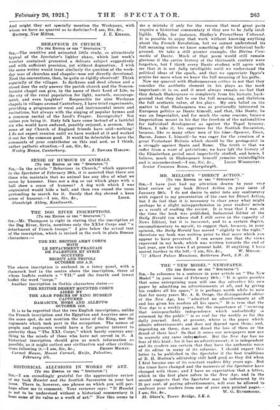HISTORICAL ALLUSIONS IN WORKS OF ART. [To THE EDITOR or
THE " SPECTATOR."] am exceedingly' grateful for the 'appreciative review of my boOk Hamlet and the Scottish Succession in your last issue. There is, however, one phrase on which you will per- liaPs allow me to comment. Your reviewer says: "If Hamlet is not to 'be understood without a historical commentary it loses some of Its value as a work of art." Now this seems to me a mistake if only for the reason that most great poets require a historical commentary if they are to be fully intel- ligible. Take, for instance, Shelley's Prometheus Unbound. It is possible to enjoy that work without knowing anything about the French Revolution, but we cannot understand its full meaning unless we know something of the historical back- ground. Or take a still greater example, the Divine Coin- media of Dante. Much of that poem would still remain glorious if the entire history of the thirteenth century were forgotten, but I think every Dante student will agree with me that it is not fully intelligible until we understand the political ideas of the epoch, and that we appreciate Dnnte's genius far more when we know the full meaning of his poem. Now my quarrel with Shakespearean critics is not that they consider the aesthetic element in his plays as the most important—it is so, and it must always remain so—but that they detach Shakespeare so completely from his historic-back- ground that they fail to see the full meaning, and theVefore the full aesthetic value, of his plays. My owh belief on the matter is that Shakespeare was as profoundly interested in European politics as Dante himself, and that, like Dante, he was an Imperialist, and for much the same reasons, because Imperialism meant in his day the freedom of the nationalities for individual development as against the Papal tyranny. Hence, I take it, his eagerness for the Scottish Succession, because, like so many other men of his time—Spenser, Essex, Bacon, James I. himself—he was eager for the creation of a great Protestant Britain which should be the protagonist in a struggle against Spain and Rome. The truth is that we suffer from a want of patriotism; we have left the history of the Elizabethan period most imperfectly studied, and hence, I believe, much in Shakespeare himself remains unintelligible and is misunderstood.—I am, Sir, &c., LILLAN WINSTANUiY. Senior Common Room, Aberystwyth.


































 Previous page
Previous page